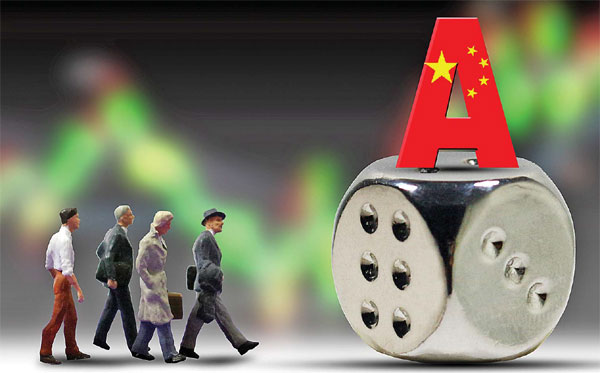Real impact of stock slump
Updated: 2015-07-31 08:26
By Zhu Ning(China Daily Europe)
|
|||||||||||
Equities are a more important source of financing than in advanced economies
The A shares of the Chinese stock market staged one of the most phenomenal cases of ascent and fall of major financial markets in a very long time, in the first half of 2015. The Shanghai-Shenzhen Composite Index started the year with an amazing, almost 100 percent climb within a matter of months. This is particularly surprising and interesting given that the Chinese economy was undergoing a gradual slowdown during the very same period.
If the sharp correction of the market itself has not attracted enough attention and contemplation, the Chinese government's response to bail out the market and keep the bullish run going has certainly garnered even more debate and controversy. The opponents of the bailout worry that the government's interference with the market's own fluctuation may not only undermine investors, especially global investors' confidence in the Chinese A-share market, but also artificially distort investors' expectations and assessment of risks in the market.

On the contrary, supporters of government efforts to stabilize or even boost the market argue that the Chinese stock market's performance will have a profound and far-reaching impact on the Chinese economy and therefore, has to be salvaged and protected.
Given the highly volatile nature of financial markets, some believe that it is close to impossible to predict or identify bubbles, sometimes even after the collapse of a market. Therefore, it is hard to assess the precise impact of the recent market meltdown in China, what it will do to the Chinese economy and whether the Chinese government has made a sound decision in its attempt to boost the market.
After all, the total value of floated shares on the Chinese A-share market is only around a third of China's GDP, much lower than the case in many developed markets, where the total value of the stock market is more than 100 percent. Also, unlike the case in many developed countries, where more than half of the country's residents invest in the stock markets and more than half of households' assets are invested in stocks and stock mutual funds, only about 15 percent of Chinese household assets are invested in the Chinese A-share market. Even with a market drop of 30 percent from its peak, some believe that only a small fraction of the Chinese will be affected by the market decline.
As clear and convincing as some statistics can be, the above statistics also have their own limitations and maybe even bias. Granted, the size of the Chinese equity market is not as big as some of the markets in the West, especially when measured against the size of the respective economy. However, it is important to point out that the Chinese financial system is also fundamentally different from many in the West, which explains why the seemingly low market value to GDP ratio in China may not properly depict the equity market's importance to the Chinese economy.
Whereas most developed financial markets practice direct financing (such as the bond market and equity market), where investors get to directly evaluate investment opportunities and vote with their own capital (vote with their feet, so to speak), the Chinese financial system is dominated by indirect financing, operated largely by giant Chinese banks. Because of banks' regulation and business culture, such a banking-dominated financial system leaves the financing demand of many entrepreneurs and small and medium-sized enterprises unanswered and unfulfilled.
To make things even worse, the Chinese equity market dominates direct financing channels, whereas many Western economies enjoy a developed bond market, as well as a stock market. For example, the total size of issuance and trading of the bond market in the United States is indeed higher than that of the US stock market. The under-development of the Chinese bond market consequently forces Chinese companies, small and even large ones, to seek financing through the stock market.
As a matter of fact, helping state-owned enterprises with finance and getting them out of their debt troubles in the 1990s was one of key motivations behind the early development of the Chinese stock market. Such a financing function is particularly valuable and indispensable to China nowadays, given China's commitment to transition its economic model from an investment-driven one to a more sustainable consumption-driven one. Traditional banking and shadow banking have shouldered most of the financing behind the Chinese real estate sector, a most important demand of the Chinese economy in the past decade. However, given the cooling off of the Chinese real estate market and the progress in Chinese interest rate liberalization reform, banking and shadow banking have gradually reached their limit in helping finance growing Chinese corporations, and the Chinese equity market will have to step up and fill such a gap.
This is exactly why the sheer size of the equity market or its relative size to the Chinese economy may be misleading when assessing the importance of the Chinese equity market to the overall economy. If the Chinese stock market were to really return to its doldrums of the past few years, not only would Chinese entrepreneurs and SOEs be cut off from their most viable financing channels, it will also leave banks under capitalized. Given the importance of banks to the Chinese economy, the impact of a disappointing Chinese stock market might be felt across almost every corner of the Chinese economy.
In particular, the sentiments of Chinese investors and even Chinese households can have a profound and far-reaching impact on the Chinese economy. Other than the fact that part of the recent rebound in the housing market is largely owing to feverish stock market activity from earlier this year, stock market runups are widely known to generate a positive wealth effect that stimulates household consumption and investment. This is particularly important and timely to China's transitioning economy, when China is in dire need of growth in the consumption sector.
Given that financial losses cause far more damage to household consumption than the contribution made by financial gains of the same magnitude, large market volatility is not necessarily what is most helpful to boosting Chinese household consumption at this critical economic transition juncture.
Probably more important than such a direct relationship is the confidence shown in the Chinese economy by international and domestic corporations, investors and households. In the wake of the 2008 global financial crisis, China launched an unprecedented 4 trillion yuan ($586 billion; 580 billion euros) stimulus package, which was aimed at both restoring short-term economic growth, and restoring confidence in China's economic prospects. As China's then premier Wen Jiabao said: "Confidence is more valuable than gold."
As a common gauge of investor sentiment, China's stock market performance is given more meaning than its mere size. In some sense, Chinese regulators' recent attempts to stabilize or even boost the stock market can be easily understood and rationalized, given that many investments in China were based entirely on future prospects, as opposed to their fundamental value. This being the case, some consider artificially boosting the stock market as a necessary, if not indispensable way to ensure market sentiment, which may directly determine the direction of the Chinese stock market or even the fate of the Chinese economy.
As important as such arguments are, however, it is important to bear in mind that many of the challenges that the Chinese economy is currently facing are indeed direct consequences of the governments' attempts to avoid the economic slowdown during the 2008 global financial crisis by misallocating resources into what the market forces would not otherwise do. If Chinese regulators were to repeat the same practice in the stock market again, the Chinese stock market and the overall economy may run even greater risks of seeing a short term rise, at the expense of a long term drop and challenges.
The author is deputy director of the Shanghai Advanced Institute of Finance. The views do not necessarily reflect those of China Daily.
(China Daily European Weekly 07/31/2015 page9)
Today's Top News
Debris found off Africa linked with Flight MH370
Former military leader Guo Boxiong expelled from CPC
Presidents vow to fight terrorism
China's youth: rebellious, or misunderstood?
Somalia offers apology, seeks China's help
Myanmar grants amnesty to 155 Chinese loggers
Bid blocked at UN to send Malaysian Airlines jet downing to int'l tribunal
Afghanistan says Taliban leader is dead
Hot Topics
Lunar probe , China growth forecasts, Emission rules get tougher, China seen through 'colored lens', International board,
Editor's Picks

|

|

|

|

|

|






